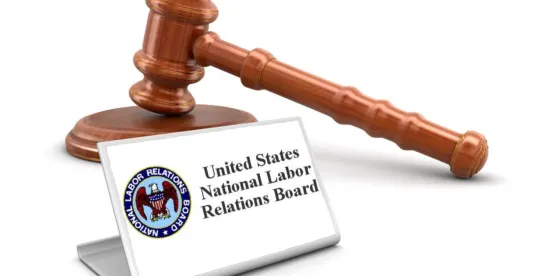The National Labor Relations Board finalized its anticipated rollback of several Trump-era union elections rules that will make it harder for employers to decertify or challenge union claims of majority status.
The Final Rule, which will likely take effect on September 30, reinstates the Board’s blocking charge procedures, changes the Board’s approach to the “voluntary recognition bar” to further insulate unions and rescinds rules that provided special exceptions for challenging voluntary recognition in the construction industry. We previously covered the Proposed Rule in a 2022 blog post, and the Final Rule closely mirrors the proposal.
The return to pre-2020 blocking charge procedures represents the most significant rule change for most employers. Under the blocking charge policy, an employer or a union can petition the Board to delay a representation election if any pending unfair labor practice charges have the potential to interfere with free choice in the election. In practice, unions often use blocking charges to attempt to delay decertification elections when employees seek to oust unpopular representatives, or representation elections when the unions anticipate defeat. The rule allows a party to an election to file unfair labor practices in anticipation of an election to attempt to delay that process, even if the charges have questionable merit. Then, the party that filed the charge can have more time to convince the employees to support them before the election actually occurs. Under the existing rule, enacted by the NLRB in 2020, unfair labor practice charges would not delay the conduct of the election, but could delay the counting of ballots or certification of election results until a final adjudication of the charge.
The change to the voluntary recognition bar also makes it more difficult for employees who oppose unionization to challenge agreements between an employer and a union for voluntary recognition. Under the existing rule, employees could seek an election even if their employer decided to voluntarily recognize a union, as long as they made such request within 45 days of receiving notice of voluntary recognition. If the union did not win that election, then the voluntary recognition would fade away. Under the new rule, if an employer elects to recognize a bargaining representative voluntarily, employees in the bargaining unit will not be able to seek an election – likely to decertify the union – until at least six months after the parties’ first bargaining session.
Finally, the construction industry changes rescind rules that increased the burden of proof for employers who recognize unions under Section 8(f) of the National Labor Relations Act. That section provides an exception to the requirement for proof of majority status because of the unique nature of construction project work. The existing rule removed any election bar from construction industry bargaining units recognized solely under Section 8(f) without a showing of majority support. The new rule reinstates the six-month election bar even where a construction industry employer relies on Section 8(f) and does not provide other, independent proof of majority status.





 />i
/>i

